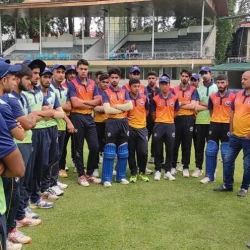Senior Congress leader and former Rajasthan Chief Minister Ashok Gehlot has questioned the central government for not taking a stand on the ongoing Israel-Iran conflict, calling out its “silence” on a critical global issue.
“Why is India silent?” asks Gehlot
Speaking to reporters at the Rajasthan Pradesh Congress Committee office on the death anniversary of Sanjay Gandhi, Gehlot expressed concern over India’s passive stance.
“Why is India not speaking out today? During Indira Gandhi’s era, India led the Non-Aligned Movement. We were seen as the voice of the third world, neutral and bold,” Gehlot said.
He further added that India was known for its independent foreign policy, but its current silence during a global crisis is troubling. Referring to the recent US action in the conflict, Gehlot said:
“America first said it would decide in 15 days and then carried out a surprise military strike. The world is anxious, but India remains silent. Why?”
Sonia Gandhi’s Statement Backed
Gehlot also supported Sonia Gandhi’s recent article on the Iran-Israel conflict, stating that her words reflected deep concern for the country’s global responsibility.
“She spoke in the national interest. That’s why BJP is uncomfortable, but people with progressive thinking have praised her.”
Praising the Legacy of Indira Gandhi
Highlighting the Congress party’s historical contributions, Gehlot recalled Indira Gandhi’s five-point programme, which addressed dowry, illiteracy, caste discrimination, family planning, and environmental protection.
“Many criticized the family planning push during the Emergency, but it was a visionary move. Today, with our population over 140 crore, those reforms seem even more necessary,” he said.
Rahul Gandhi as a Modern Reformer
Gehlot described Rahul Gandhi as a leader continuing that reformist legacy through his push for a caste-based census.
“This will help design inclusive welfare schemes for SCs, STs, OBCs, and even the economically weaker sections of general categories.”
Congress’ Commitment to Social Reform
He credited the Congress Party for introducing major reforms like:
- Panchayati Raj constitutional amendments
- Lowering the voting age to 18
- Expanding technology and telecom access
“From Nehru to Rajiv Gandhi, Congress governments have driven change,” Gehlot said.
He also noted that even before independence, leaders like Mahatma Gandhi, Maulana Azad, and Sardar Patel took visionary steps that shaped modern India.














